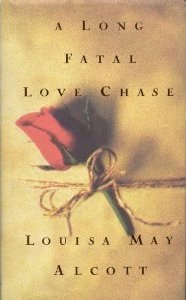 I found this novel in a thrift store. Before that, I had no idea it existed. I probably would have bought this book for the cover itself, but of course I also recognized the name Louisa May Alcott, who most famously wrote Little Women (which I am ashamed to say I have never read – but it is on my list!!).
I found this novel in a thrift store. Before that, I had no idea it existed. I probably would have bought this book for the cover itself, but of course I also recognized the name Louisa May Alcott, who most famously wrote Little Women (which I am ashamed to say I have never read – but it is on my list!!).
Not only is the cover design on this book gorgeous, but the trim size is unique (it’s a little narrower and taller than a typical hardcover or paperback), it has deckled edges, and the tops of all the pages are dyed with a wine/burgandy color. My inner book nerd is soooo happy to have this in my collection! Oh, and it’s also a good story. 😉
I read this book directly after reading The Woman in White by Wilkie Collins for the first time. Best. Decision. Ever. It has a very similar vibe to The Woman in White, but an even closer match for it in my opinion is the massively popular gothic classic, Rebecca, by Daphne DuMaurier.
Both A Long Fatal Love Chase and Rebecca begin with a young orphan girl living in less than desirable circumstances. Both by chance meet an older man who is well off, mysterious, and offer them an escape from their current life. Both girls cannot believe their luck to have found a man to rescue them, only to quickly find out that their new lives aren’t exactly what they had hoped for.
In A Long Fatal Love Chase, this man is called Phillip Tempest. He is of middle age and has not a care in the world for anything at all. He has seen and done everything and hasn’t found anything to hold his interest…until Rosamond. She is a young woman trapped inside a dreary household with a grandfather who pays no attention to her, and to her, Phillip is pure hope and adventure. He takes her on his yacht and promises her a lifetime of traveling and riches, and she happily accepts on the condition that they marry so they don’t cause a scandal. They live together in pure happiness for a year before things begin to unravel. Rosamond slowly begins to learn that her husband is not exactly who he says he is, and when she learns the truth behind her marriage, she flees from him. But Phillip Tempest is not one so easily escaped, and chasing after her brings him more excitement than he’s felt in years.
I really loved this book. I have been on such a roll with great books, I’m afraid it’s going to inevitably end and I will be stuck in a slump of ick for months 😬 But let’s not think about that! *furiously knocks on wood*
Reading this novel hot on the heels of The Woman in White probably did this book some favors. It isn’t perfect, but since I was in the spooky/gothic mood already I think my reading experience was enhanced.
In truth, the first few pages had me sweating. I found the writing a little clumsy, and I was worried that I not only wasn’t going to be able to respect this book, but that the other of Alcott’s novels would be ruined for me before I ever got a chance to read them. Luckily, things improved on that front rather quickly. By the end of chapter one I had forgiven the awkward beginning sentences and was quite excited to read more.
The chapters are quite short, and it isn’t a particularly long book at just under 250 pages, so if you’re looking for something quick to read before fall turns fully into winter, this might be a perfect choice for you!
[The remainder of this post contains plot spoilers]
This novel is by no means a perfect book, but for me the excitement and intrigue outweigh the issues I had with it. Rosamond is a very spirited woman who would rather die than live a dishonest or scandalous life, and eventually she does die for it. However, her wish from the beginning of the novel to have an adventurous life was fulfilled. You could say this novel is a lesson to “Be careful what you wish for”. Here is the paragraph from the opening of the novel::
“I tell you I cannot bear it! I shall do something desperate if this life is not changed soon. It gets worse and worse, and I often feel as if I’d gladly sell my soul to Satan for a year of freedom”
She got exactly that, didn’t she? One year of ‘wedded’ bliss before things turned sour and the remainder of her life was spent fleeing, hiding, and deceiving in order to be free of the Satan she had sold herself to.
The character of Phillip reminded me of Sir Percival Glyde from The Woman in White. He is by all outside accounts a ‘catch’; handsome, rich, cultured, but has a dark almost sinister side that comes out behind closed doors. Such great characters both these men are! Scoundrels!! I also love that Alcott named him Tempest, and the symbolism of his introcuction actually with a ‘tempest’ of a storm was perfect foreshadowing. He even says to Rose “Whenever I enter a house where some adventure or experience is to befall me, I invariably bring a tempest with me”. These first passages are what gripped me and kept me wanting to know more. What adventure or experience is he going to have this time? Excellent craftsmanship of story there. A grand example of what I want from all gothic novels!!
Phillip is probably my favorite character in this story in terms of development. He begins as the handsome stranger with presumably a dark side (so much potential in the set up of his character), and ends up basically going mad with desperation and jealousy. Obviously it’s not a positive story, but it is a satisfying ending for the story it is. While I did expect Rosamond to die (see more on that below), that he unknowingly killed her himself in his madness was a perfect ending in my opinion.
One thing that began to annoy me, mostly as the story progressed, was how detached the perspective was. This is an issue I always have with my own writing, so I notice it keenly in the books I read…I begin to almost summarize what is happening in the story instead of immersing the reader in the narrative. “Telling” and not “showing”. Some scenes just seemed so detached near the end that I felt like I was just skimming it rather than being there with the characters.
Along the same lines as my last point…I think this novel could have been longer! Perhaps that is just a personal preference, but some more development in certain points could have really taken this novel to the next level. Especially after finding out it was originally written to be a serialized novel, I would have thought there would be a little more substance or some detailed subplots especially as things sped up in the last third of the novel (at the convent and afterward).
Lastly, while I love the title, I’m also torn about it. Obviously when the word ‘fatal’ is in the name of the novel, you will expect someone to die. While Willoughby does die somewhat early in the story, it is obvious that he is not who is meant in the title reference, so you are still waiting for the fatality to hit. Since it doesn’t come until literally the last few pages, you are left basically knowing the very end from the very beginning. If there was one thing I could have added to this book it probably would have been more death as horrible as that sounds. Then it could have been a greater payoff in the last few pages when we find that Rosamond was killed, maybe we would expect it less. Or else perhaps a change of title is all that would be needed to produce a more profound effect in that last scene. I read the other working titles for this story were A Modern Mephistopheles and Fair Rosamond, both of which I like (I think good titles are so hard to come up with myself!!).
I find it hard to believe that I’ve never heard any talk about this book anywhere before coming across it in that thrift store completely by chance. It was apparently not published when it was originally written because it was too ‘sensationalist’. But by today’s standards it is nothing offensive in the least and it definitely deserves to be talked about more. Hopefully this post inspires someone else out there to read this book who hasn’t heard of it before!
What books have you read that you find underrated?

